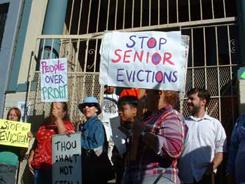
With the highest concentration of senior citizens in the nation, Los Angeles County is bracing for a surge in needed services as the elderly population is expected to double to nearly 3 million over the next two decades.
And in a bid to get ahead of the expected increase in demand, officials on Monday announced a countywide initiative with nearly every department aimed at improving services to seniors and making it easier for them to find and qualify for benefits.
"The strength of this new administrative structure is the ability to get multiple departments to improve services to specific target populations and to work together," Chief Executive Officer Bill Fujioka said.
"What we are going to do is improve thecoordination of services to the senior population in Los Angeles County."
As 9,000 baby boomers turn 60 every day in the county and the economy sours, officials said there is an urgent need to better coordinate services among senior services, welfare, health, mental health, consumer affairs, military and veterans affairs and other departments.
Officials are especially interested in creating a central call center seniors could contact to help navigate the maze of available services.
"There are 20 departments that provide services to seniors now," Community and Senior Services spokeswoman Patricia Holt said. "We are looking at ways to improve access to those services."
The initiative comes as experts say hundreds of thousands of low-income seniors in the county are finding it increasingly hard to make ends meet as the costs of gas, food, medical care and housing soar.
"We, of course, know that the price of housing has become very expensive," said Gerald McIntyre, directing attorney at the National Senior Citizens Law Center in Los Angeles.
"And for people who don't own their own homes - and most people in L.A. are renters - that is going to become really prohibitive."
A UCLA report last month found that the average yearly Social Security income of seniors is $12,540 and not enough to live on - yet more than 30 percent of California seniors rely on it exclusively.
With an annual median retirement income of $18,645, senior women fall short of meeting their basic living expenses. Senior men, whose annual median retirement income is $24,874, can pay their rent and other expenses, but those who still owe on a mortgage find it difficult to pay the bills.
To help close the gap, the county offers a variety of services ranging from meal programs at senior centers and home delivery of meals to legal services and senior employment programs for those 55 or older.
The county also provides health and mental health services, investigates fraud and elder abuse, and sends workers to seniors' homes to provide personal care and housekeeping.
County Supervisor Yvonne B. Burke said the board needs to take a closer look at senior services and determine whether they are adequate.
She also is interested in finding out whether the county's resources are sufficient to deal with a growing number of cases of elder abuse and fraud.
"We need to have seamless services regarding elder fraud," Burke said. "They are often victimized by people who are trying to get rich quick, whether it's construction scams or whatever it is."
Under Fujioka's plan, officials will identify senior programs, draft a plan to address their needs and establish goals.
Fujioka is particularly interested in increasing coordination among In-Home Supportive Services, Adult Protective Services, the Area Agency on Aging, Mental Health Services and Public Guardian services.
"The CEO's plan to create a more comprehensive approach to serving our county's seniors is a step forward in providing for our county's very precious resource," said Tony Bell, spokesman for Supervisor Michael D. Antonovich.
"This plan will reduce overlap and create a more cost-effective and coordinated system that will benefit our county's seniors, as well as the county taxpayers."
FAIR USE NOTICE.This document may contain copyrighted material the use of which may not have been specifically authorized by the copyright owner. Tenants Together is making this article available on our website in an effort to advance the understanding of tenant rights issues in California. We believe that this constitutes a 'fair use' of any such copyrighted material as provided for in section 107 of the U.S. Copyright Law. If you wish to use this copyrighted material for purposes of your own that go beyond 'fair use,' you must obtain permission from the copyright owner.
